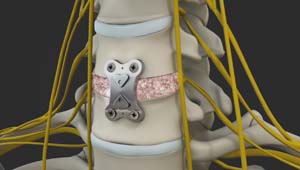Anterior Cervical Discectomy and Fusion (ACDF)

What is a Herniated Disc?
Herniated disc is a condition in which the soft, gel-like center of the disc (nucleus pulposus) bulges out through the damaged or broken disc's tough, outer ring (annulus fibrosus). Besides, bony out growths also known as bone spurs or bone osteophytes are formed due to the accumulation of calcium in the spine joints. The pressure induced by a herniated disc or bone spur on nerve roots, ligaments or the spinal cord may cause pain in the neck and/or arms, numbness or weakness in the arms, forearms or fingers, and lack of coordination.
What is Anterior Cervical Discectomy and Fusion Procedure?
Anterior cervical discectomy with fusion (ACDF) is an operative procedure to relieve compression or pressure on nerve roots and/or the spinal cord due to a herniated disc or bone spur in the neck.
In anterior cervical discectomy with fusion, your surgeon approaches the cervical spine through a small incision in the front of the neck and removes the total disc or a part of the disc along with any bony material that is compressing or putting pressure on the nerves and producing pain. Spinal fusion implies placing a bone graft between the two affected vertebral bodies encouraging the bone growth between the vertebrae. The bone graft acts as a medium for binding the two vertebral bones, and grows as a single vertebra that stabilizes the spine. It also helps to maintain the normal disc height.
Indications of Anterior Cervical Discectomy and Fusion Procedure
As most nerves to the body (e.g., arms, chest, abdomen, and legs) pass through the neck region from the brain, pressure on the spinal cord in the neck region (cervical spine) can be very problematic. If you have these symptoms, you will be a potential candidate for anterior cervical discectomy procedure, but only after non-surgical treatment methods fail. Cervical discectomy can reduce the pressure on the nerve roots and provides pain relief.
Before recommending surgery, your surgeon considers several factors such as your health condition, age, lifestyle and anticipated level of activity following surgery.
Anterior Cervical Discectomy and Fusion Procedure
You will be placed on your back. Your surgeon makes a small incision in the front side of the neck under anesthesia and locates the source of neural compression (pressure zone). Then, the intervertebral disc that is compressing the nerve root will be removed. A bone graft is then placed between the two vertebral bodies. In certain instances, metal plates or pins may be used for providing enough support and stability, and to ease the fusion of the vertebrae.
Post-operative Instructions following Anterior Cervical Discectomy and Fusion Procedure
A specific postoperative recovery/exercise plan will be given by your physician to help you return to normal activity at the earliest possible. The duration of hospital stay depends on this treatment plan. You will be able to wake up and walk by the end of the first day after the surgery. You would be able to resume your work within 3-6 weeks, depending on your body's healing status and the type of work/activity that you plan to resume. Discuss with your spinal surgeon and follow the instructions for optimized healing and appropriate recovery after the procedure.
Risks or Complications of Anterior Cervical Discectomy and Fusion Procedure
Treatment results are different for each patient. In addition to the anesthetic complications, spinal surgery is associated with some potential risks such as infection, blood loss, blood clots, nerve damage, and bowel and bladder problems. Failure to fuse the vertebral bones with the bone graft (fusion failure) is an important complication of spinal fusion which requires an additional surgery.
Please take your physician's advice for a complete list of indications, clinical results, adverse effects, warnings and precautions, and other relevant medical information about the anterior cervical discectomy with fusion surgery.


